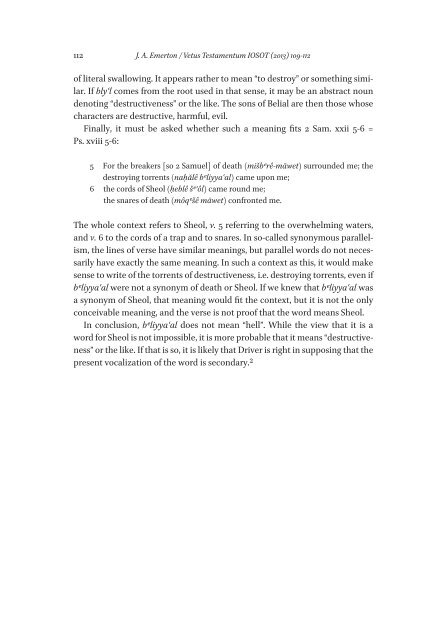Special Issue IOSOT 2013 - Books and Journals
Special Issue IOSOT 2013 - Books and Journals
Special Issue IOSOT 2013 - Books and Journals
You also want an ePaper? Increase the reach of your titles
YUMPU automatically turns print PDFs into web optimized ePapers that Google loves.
112 J. A. Emerton / Vetus Testamentum <strong>IOSOT</strong> (<strong>2013</strong>) 109-112<br />
of literal swallowing. It appears rather to mean “to destroy” or something similar.<br />
If blyʿl comes from the root used in that sense, it may be an abstract noun<br />
denoting “destructiveness” or the like. The sons of Belial are then those whose<br />
characters are destructive, harmful, evil.<br />
Finally, it must be asked whether such a meaning fits 2 Sam. xxii 5-6 =<br />
Ps. xviii 5-6:<br />
5 For the breakers [so 2 Samuel] of death (mišberê-māwet) surrounded me; the<br />
destroying torrents (naḥălê beliyyaʿal) came upon me;<br />
6 the cords of Sheol (ḥeblê šeʾôl) came round me;<br />
the snares of death (môqešê māwet) confronted me.<br />
The whole context refers to Sheol, v. 5 referring to the overwhelming waters,<br />
<strong>and</strong> v. 6 to the cords of a trap <strong>and</strong> to snares. In so-called synonymous parallelism,<br />
the lines of verse have similar meanings, but parallel words do not necessarily<br />
have exactly the same meaning. In such a context as this, it would make<br />
sense to write of the torrents of destructiveness, i.e. destroying torrents, even if<br />
beliyyaʿal were not a synonym of death or Sheol. If we knew that beliyyaʿal was<br />
a synonym of Sheol, that meaning would fit the context, but it is not the only<br />
conceivable meaning, <strong>and</strong> the verse is not proof that the word means Sheol.<br />
In conclusion, beliyyaʿal does not mean “hell”. While the view that it is a<br />
word for Sheol is not impossible, it is more probable that it means “destructiveness”<br />
or the like. If that is so, it is likely that Driver is right in supposing that the<br />
present vocalization of the word is secondary.2








![Am HaSefer [Volk des Buches] - Books and Journals](https://img.yumpu.com/20648352/1/174x260/am-hasefer-volk-des-buches-books-and-journals.jpg?quality=85)







